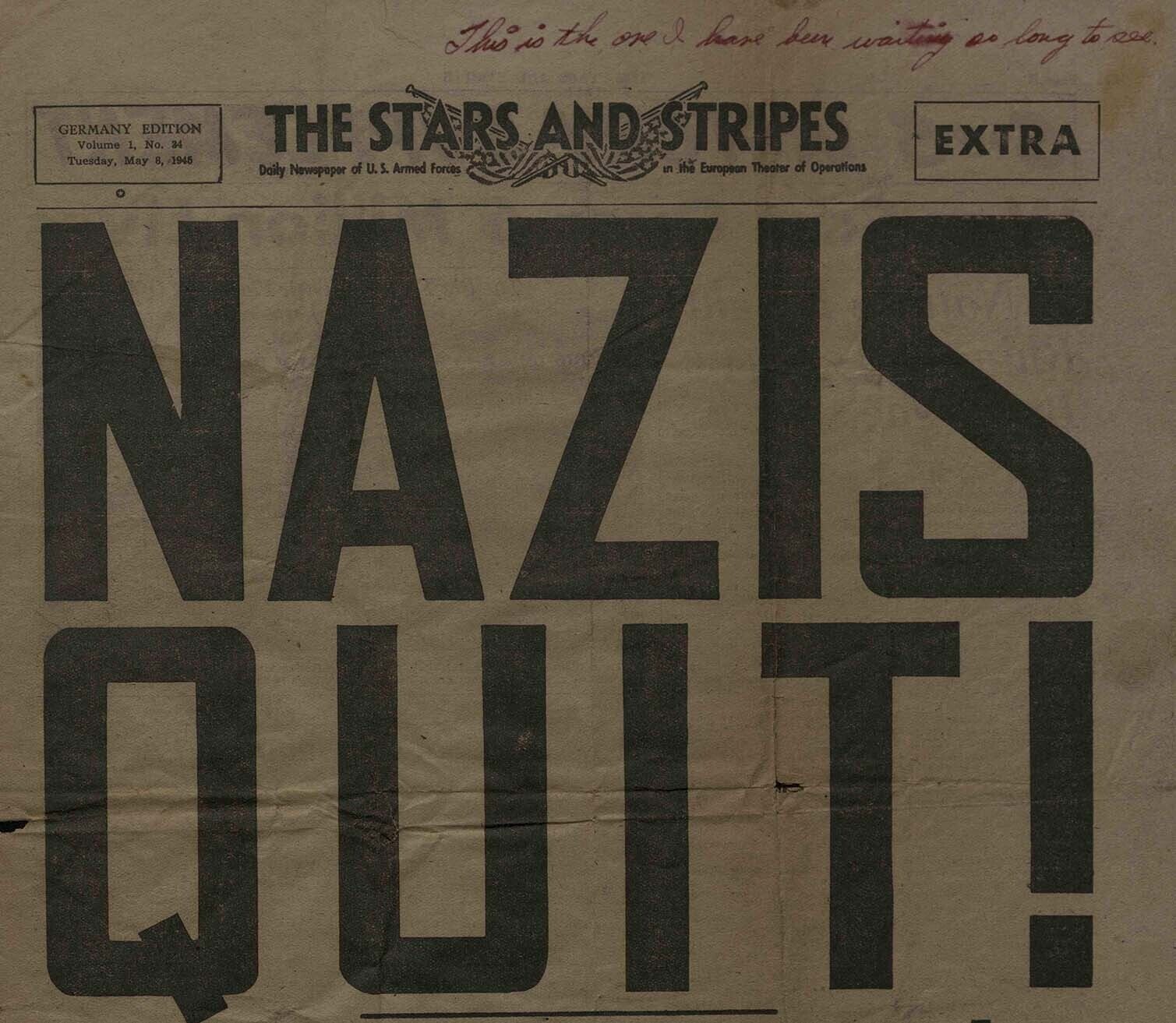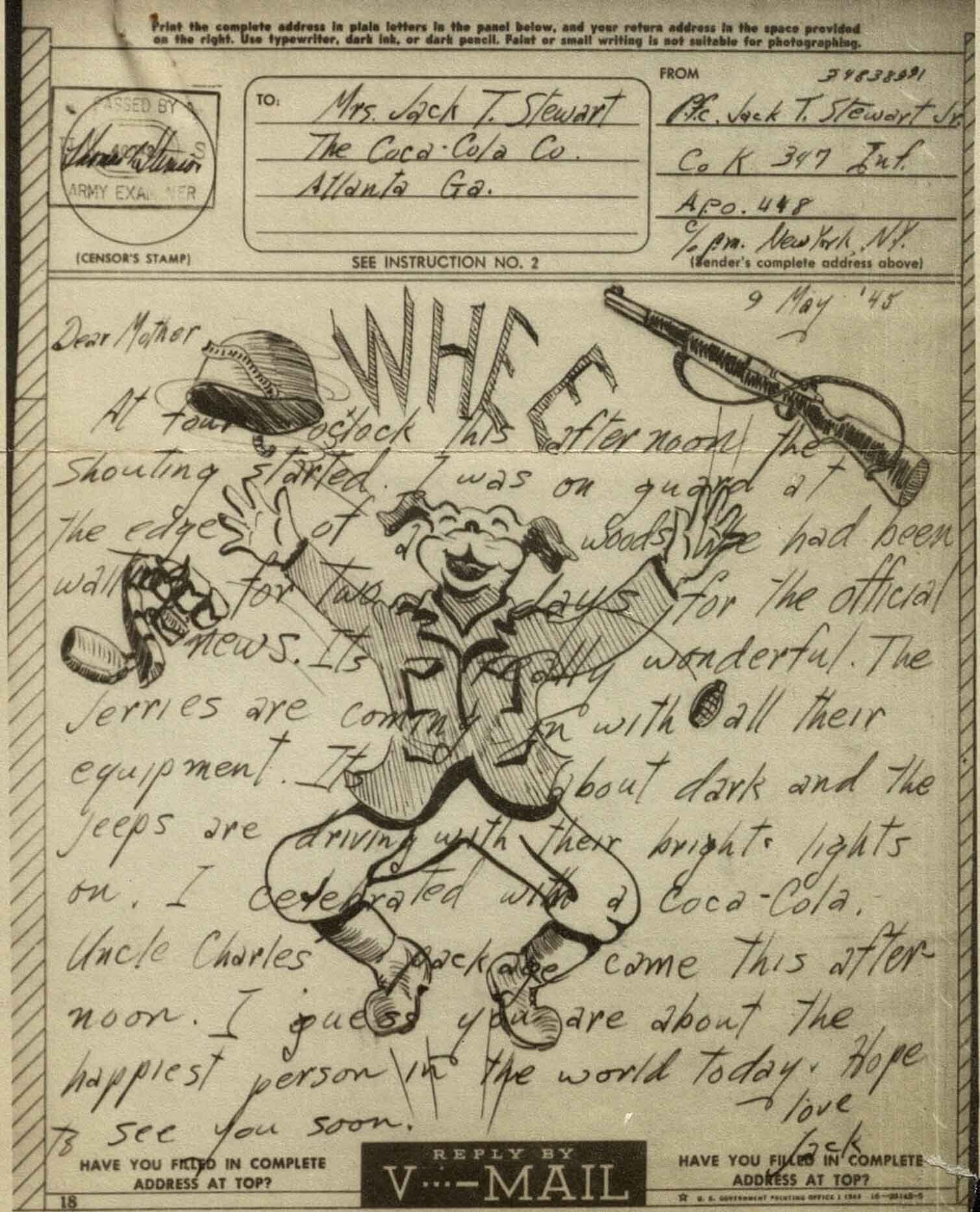Looking for Cognac and someone to kiss: Celebrating VE Day
The 8th May is VE Day, the formal acceptance by the Allies of Nazi Germany’s unconditional surrender. Famous photographed moments live on in public memory; a sailor kissing a nurse in Times Square and soldiers dancing in London conjure up an image of all out celebration. For millions of people around the world, this was the case, but as documents from the newly published America in World War Two: Oral Histories and Personal Accounts reveal, reactions to victory in Europe were more nuanced than this.

Image © Stars and Stripes. Please direct copyright queries relating to Stars and Stripes to permissions@stripes.com. Further reproduction prohibited without permission.
Personal collections, drawn from the holdings of The National WWII Museum in New Orleans, include a v-mail sent by Sergeant Jack Stewart who served with the 347th Infantry Regiment, 87th Infantry Division, Third Army in European Theater of Operations, in which he conveys utter joy at hearing the news:

Image © The National WWII Museum. Further reproduction prohibited without permission.
For many Allied service personnel the war was only half over, however; victory in Europe did not necessarily mean a ticket home for Americans deployed overseas. Bitter fighting was ongoing in the Pacific Theatre, particularly with the Battle of Okinawa, and hundreds of thousands found themselves on ships bound for the region. In Europe, the US military formed a significant part of the occupation force in post-war Germany, as well as providing medical care and aid for refugees and survivors of concentration, labour and prison camps. Even those who had enough points to qualify for demobilisation did not immediately get to return to the United States.
Sergeant Herman J. Obermayer, who served with the 1291st Engineer Combat Battalion in France as part of the medical dispatch, was one of around three million American soldiers in Europe on VE Day. He wrote a long letter to his parents describing the reaction of his fellow servicemen as well as the French civilians. On hearing the news he went into the village, where there were “three young girls who immediately offered to kiss me. […] On Tuesday I went into town and found the place bedecked with flags and filled with a lot of G.I.s, both black and white, wandering around looking for cognac and someone to kiss them”. These celebrations seemed hollow to Herman, however, who reflected that the news of victory in Europe “brought relief to the doughs who were dodging bullets in fox-holes deep in Germany; it brought on drunken celebration in New York, London, Chicago; but for the men like myself who are not stationed in Paris, but are still a safe distance from the shell-fire in the ETO there was nothing but a few futile attempts to get drunk on “biere” and many bitter remarks about ourselves and the War still to be fought on the other side of the world”. With too few points to qualify for demobilisation, Obermayer was sent to Germany on occupation duty. He finally returned home in April 1946.

Image © The National WWII Museum. Further reproduction prohibited without permission.
Back home in America, the victory in Europe came whilst the country was still in official mourning after the sudden death of President Roosevelt. Mr. Buzek of Ohio offers an insight into reactions to the news of Germany’s surrender in his local town, writing to his son: “Well VE has come & thank God it is over in Europe & now they can get busy over there. […] the bobby socks smiled but older ones had a solemn look – most everyone here has someone in service and know it is only ½ over”. Buzek’s son, Edward, was still serving in the China Burma India Theatre at this point.

Image © The National WWII Museum. Further reproduction prohibited without permission.
For more information about America in World War two: Oral Histories and Personal Accounts, including free trial access and price enquiries, please email us at info@amdigital.co.uk.
Recent posts

The blog highlights American Committee on Africa, module II's rich documentation of anti-apartheid activism, focusing on the National Peace Accord, global solidarity, and student-led divestment campaigns. It explores the pivotal role of universities, protests, and public education in pressuring institutions to divest from apartheid, shaping global attitudes toward social justice and reform.

This blog examines how primary sources can be used to trace the impact of young voices on society, particularly during pivotal voting reforms in the UK and the US. Explore materials that reveal insights into youth activism, intergenerational gaps, and societal perceptions, highlighting their interdisciplinary value for studying youth culture, activism, and girlhood across history.
